- Home
- Mark Wayne McGinnis
Ship Wrecked Page 11
Ship Wrecked Read online
Page 11
The wind came up, and he immediately went down on all fours. Catching his breath, he slowly crawled across the top of the ship and noticed that much of the forward and portside of the fuselage was indeed buried into the top of the plateau. The good news, if there was any, was that it looked mostly like dirt—not solid rock—that it was lodged in. Proceeding toward the stern, he ventured another quick standup and rose up to his full height; he could now peer over the ridge to gain a better idea of what exactly happened. There looked to be a three-hundred-foot-long trench stretched across the open plain. Apparently XI, bringing the Primion in for a landing, had somehow lost control. The ship’s forward momentum hit the ground hard, and it continued to slide. The Primion then went sideways, jumped the small ridge, and dropped down to where it now lay partially imbedded. The disturbed loose dirt at the top of the plateau had immediately avalanched down to settle on the upper forward starboard side of the ship. Without receiving help from some heavy excavating equipment—moving the many tons of fallen dirt away—the Primion wasn’t going anywhere anytime soon.
The wind was picking up again. No way could he climb back inside the ship the way he’d come out. Now again squatting, above the roar of the windy gusts, he yelled out, “Primion … can you hear me?” He waited but heard nothing back. Continuing to crawl on all fours, Cameron moved toward the midpoint of the fuselage. Since the curvature of the fuselage was minimal at the top of the ship, all he really had to concern himself with was not getting blown off.
Cameron, creeping forward, paused every so often to quickly glance over the side to check to see if there was an accessible hatchway, or some other entrance, back into the vessel. It occurred to him that unless he discovered another access, he just might be spending the night outside in this alien land. The mere thought of such a thing happening caused him to nervously start chewing the inside of his lower lip.
Now two-thirds back to the stern, the wind suddenly died completely. Cameron maintained his same kneeling position in case it was simply a lull. After a full minute passed, he slowly rose to his feet then began to walk upright. Traversing the hull was easier now. To his left, he discovered the slope of the ship was almost even with the plateau.
Suddenly, Cameron froze and listened, hearing a distant rumbling. He started to feel a vibration rising-up through his boots. Maybe it’s another ship? Excited, he hurried aft, gazing upward at the sky. By chance, he glanced over to his left and saw the unthinkable….
Chapter 23
In the split-second he had to react, Cameron drove his body flat onto the hull, covering his head with his arms and hands. Lying there, trying to make sense of what he’d just seen, the first of the fast-charging whatever they were—careening off the plateau ledge. He could smell their wild-musky scent. Too many to count, they were now hurtling several feet above his head—a swath of them, seven or eight beasts wide, and he couldn’t guess at how many were following behind—one after another. Like a thundering herd of buffalo yet completely different. For one thing, they were white and seemed to possess hides that were thick and hairless, like those found on a rhinoceros or an elephant.
Cameron, venturing a glance over his head, caught a wild flurry of passing hooves and underbellies. As clumps of dirt and small rocks cascaded down onto his back, something hard and sharp nailed him in the forehead. He winced through the pain and watched, peering beneath his arms, as the stampede of airborne animals continued to leap over him then drop in a several thousand-foot free-fall to the valley below. Time seemed to slow as he watched many of them, perhaps hundreds, unknowingly take their final vault into the abyss below. Feeling sick, Cameron closed his eyes and waited.
When the loud rumbling of hooves finally ceased—the last of them passing by overhead—the worst was yet to follow. Distant sounds erupted upward as the falling smashed onto the valley floor below. Thump! Thump! Thump! Thump! Thump! Thump! Thump! Thump!
What he had just seen reminded him of the urban legend of lemmings leaping to their deaths. In fact, according to his encyclopedia readings, lemmings didn’t jump to their deaths like many thought. It turned out that it was all a good story that grew out of a 19050s nature documentary that Disney had created. And once a good story got going …
Cameron continued to lie still for several more minutes. Strangely, his thoughts turned to the Minal Loth—recently having underwent the same long descent to the valley floor below. If that creature survived the fall, it now would have plenty to eat. It would be another way to look at it—the Loth owed him a great big thank you for flinging its scrawny ass out of the airlock.
Pushing up onto his hands and knees, Cameron slowly stood upright. The plateau was almost at eye-level. Standing not ten feet away were the few remaining herd. Three—easily eight feet tall each—were as broad as a New York City bus. Beautiful beasts, they stood still, staring straight back at him. Not a whole lot of intelligence gleamed back at him from behind their big brown eyes. Already losing interest, one by one they began lowering their heads to graze. Cameron knew that was a blessing. What he’d just witnessed, the horrific mass death fall, was something he knew he would never forget.
He turned in the opposite direction and stared out toward the valley. From this position he couldn’t see the valley floor below. Glad for that, it was time for him to find a way back inside the Primion.
As Cameron continued trudging toward the stern, he probed the gash on his forehead with his fingertips. Taking them away, he realized they were covered in blood. Terrific. His pace slowed, noting a square access panel now sliding open no more than fifteen feet in front of him.
* * *
Re-entering the ship from the open topside hatch, he’d made his way along what was probably some kind of duct, perhaps intended for service droids. Unable to stand completely upright as it narrowed, he was beginning to feel claustrophobic. He eventually emerged through a panel on the third level—mid-ship.
It was like being inside a different spacecraft. Now, with all the ship’s bright lights turned on, its electronics functionality coming back online, Cameron found himself a bit overwhelmed. Perhaps the biggest difference was the new abundance of color. No longer the same drab, lifeless-looking, vessel he’d thought it was. 3D holographic displays were in abundance—some following the contours of bulkheads as he passed. Other ones simply appeared as he made his way to the bridge, as though vying—even competing—for his attention. As if the vessel, bereft of life for so long, was now acting like an attention-starved puppy, suddenly aware his master had returned home after a long evening out on the town. He knew it wasn’t the ship so much as it was TAM, the ship’s recently restored artificial intelligence.
“Cameron … you have a nasty wound on your forehead. I’d be happy to take a look at it for you. Fix you right up.”
Cameron stopped, looking up and around where he stood. Fix you right up was an Earth, more precisely an American, colloquialism. He asked, “Are you the same ship’s AI as before? How do you know … how to speak like that? So … um … human-like?”
“Thanks to you, in good part, I have regained eighty-seven percent functionality. I am grateful. I am thankful.”
“And that’s redundant … and, no offense, but you’re talking about emotions. You’re a computer.”
The prolonged silence that followed only underscored the fact he’d probably said something insensitive. But then, so what? I’m only speaking to a computer, he reasoned.
Cameron made his way to the closest jump stand and took it down to the first level. Heading for the bridge, he heard the AI—continuing where it had left off.
“On your planet, at its current level of technological advancement, I can understand why you would say such a thing. But Cameron, this is not Earth. Expansive, self-evolving neuro-intelligence has been around on Thidion for over two centuries. Where computers are certainly prevalent on Earth, electronically they are not self-aware. I am self-aware. I am, or was … an active part of the Primion crew. I reason and
deduct and calculate. I also feel emotions not so different from yours. I also can … and will …die, so to speak. I have a termination date—one I purposely have not been made cognizant of yet. Understand, Cameron, I am not an it … I am a … her. I have chosen a female designation. Although I could easily have chosen to be male, or sex-gender neuter, I chose to be what I am.”
Cameron unconsciously had stopped walking ahead. Listening to the AI, or whatever it was, he found he had questions—a lot of them. But he didn’t want to be insulting, as he’d already proven himself capable of.
He asked, “Do you wish to…”
“To be organic?” she asked, finishing his sentence.
He waited for her to answer.
“Yes and no.”
“Can you explain?” he asked, absentmindedly probing his head gash.
“I have sensory inputs that provide far more tactile feeling than what you, an organic, are capable of. I have the equivalent of pleasure receptors and pain receptors. I can take presence into a physical form—what you would call an advanced droid, or even multiple droids all at one time.”
Reaching the bridge, he sighed, “Okay … um … I’m not sure if that really answers my question. Maybe it’s not an appropriate question.”
“There is no definitive answer, Cameron. I would have to give up a lot to become organic.”
“Cool. I guess it’s good to be happy with what … who … you are.” Cameron meant it but was becoming completely distracted. When he earlier had hurried from the bridge to get rid of the Minal Loth, the ship was only beginning to come alive. Now the ship was nothing short of extraordinary—far more technology than he’d been aware of earlier. There were large, high-up, virtual displays that followed the contours of the bridge. At present, they revealed an amazing actual view of the outside world. He could see the half-buried Primion situated on a precarious ledge just below the edge of the plateau. Much of the portside of the ship was hanging over a sheer cliff. What he hadn’t been fully aware of was the ridgeline the ship was perched atop. Continuing along behind the ship, it looked almost road-like. He guessed it gradually sloped all the way down to the valley floor below. The display changed next to another view, to a different scenic landscape, but one undoubtedly on the same planet. It showed a babbling brook within a crop of tall trees. The view then rapidly changed to one showing the striking terrain—the open plains of the plateau. Almost like someone with a remote control was arbitrarily, annoyingly, changing channels far too quickly.
Head throbbing from the overabundance of sensory input, Cameron plopped down onto a center console seat and closed his eyes.
“Please let me take a look at that … dress your wound.”
What Cameron most wanted was to go home. Be back in Larksburg Stand, never having loaded up his truck in the first place for another year at school. To a university and internship far away from Heather—although nowhere near as far away as he was now.
More irritably than he intended, he said, “There’s nobody else here … Just how, exactly, are you planning on dressing my wound?”
“Come to the Juvinate Plastron … It’s located on this level. I’ll guide you to it.”
Cameron opened his eyes wide and glanced about the deck. The inactive, disabled XI droid was no longer lying there. Probably removed while he was outside the ship. “Um … so what do I call you? Do I call you TAM?”
“I would prefer that you call me Alice.”
Her, its, voice sounded humanlike. She seemed to care. But does she really? His gash still seeping blood and he was starting to feel woozy. “Okay, Alice, please show me where I need to go.”
Chapter 24
On his way to the Juvinate Plastron, Cameron passed no fewer than ten previously unseen droids. Several were the basic-looking robotic type that skittered along the deck, while others seemed almost humanlike. Not so much for having flesh and hair, but more to their height—five to six feet tall—and for possessing heads, arms, and legs. Back on Earth, each would stand out in a crowd—a weird facsimile of a real person. He’d found himself waving or nodding to them as he passed and receiving peculiar responses back—including head tilting and what almost seemed like embarrassment.
“Primion droids are unaccustomed to being greeted in such a way,” Alice remarked.
“So people don’t greet or say hello to each other on this ship?” he asked.
“Droids are not people.”
“Not self-aware … like you say you are?” Cameron waited for her reply but none came. Maybe, he thought, Alice thinks she is a step above the lowly droids that service the ship.
“Here you are, Cameron. You have reached the Juvinate Plastron.”
The compartment was oval-shaped, of course. Eight padded platforms, located at each station, weren’t really beds, per se, due to an absence of bed covers and sheets. A similar group of holographic displays hung in mid-air at each medical station, offering some kind of diagnostic information that made zero sense to Cameron.
Cameron knew that a plastron was the bottom of a turtle’s shell, and he supposed that made sense because of the oval shape. But he had never heard of the word juvinate before. Maybe that is their version of rejuvenate or something …
“Please take a seat at any of the Juvinate hubs.”
Cameron, choosing the closest one, took a seat on the padded platform. He looked around and noticed, exiting from an adjacent compartment, one of the quasi-human-looking droids striding toward him.
“Hello, Cameron. I am Lutous Bright 953. I will be attending to your injuries. Is that acceptable?”
Cameron shrugged. “Sure … Why not?” The droid’s face, with its plastic-looking eyes, nose and mouth, wore a faux pleasant expression. He noticed the droids here—none were wearing clothes—were gender non-specific. Even Lutous Bright 953’s voice was neutrally pitched, neither high nor low. Cameron recalled watching on HULU an older Saturday Night Live episode and was reminded of one of the show’s reoccurring characters.
“Hey … would you mind if I called you Pat? Easier to remember.”
The droid, giving Cameron a tilted head response, said, “I will add Pat as an alternative pseudonym. Please lie back, and I will begin.”
“Hold on. Tell me what you’re going to do, first,” he said, all of a sudden feeling uneasy about this. A few details of what he could expect—such as how much it was going to hurt—were in order.
“I have already begun an inoculation process. You will need immunity against a variety of diseases, alien to your system. Foreign bacteria and other microbes your body is not prepared to reject. Such inoculations should have taken place prior to your going outside the ship. Next, I will repair the epidermis and dermis layers of flesh above your right eye. Please do not move or speak until the process is complete. “
Reluctantly, Cameron leaned back, making himself comfortable, and waited for whatever happened next. Pat leaned over him—its face inches from his own.
“You really … um … get up close and personal, huh?”
“Please do not speak.”
It occurred to Cameron that the treatment had already begun. While he was waiting for the droid to utilize some kind of medical device or apparatus, the droid, Pat, was the device. It made sense. Why have specialized medical droids go to the trouble of using some kind of alternate apparatus when the droid itself could be that apparatus?
“Ouch! Whatever you’re doing to my head … it hurts,” Cameron said, gritting his teeth. It didn’t just kinda hurt. It really, really, hurt.
“Shush.”
He glared up at the robot. He didn’t like being shushed. The pain, though, was slowly dissipating. He wanted to touch the gash on his forehead but not enough to be reprimanded by the overly close Pat.
The droid backed off and, using a finger on one of its hands, probed the damaged area on his forehead. The wound no longer hurt. In fact, it felt completely normal.
Pat then stood up all the way and said, “Your inju
ry has been repaired. When you are ready, you can sit up.”
“That’s it? I’m all better?”
“All better,” Pat said.
Cameron sat up and touched his forehead. Sure enough, the skin there felt smooth. “Can I ask you a question, Pat?”
“Yes. Do you have another medical condition you would like to discuss?”
“Condition? No. I want to know …” Cameron paused, “How exactly did you repair my skin so rapidly? Skin … epidermis layers require time to heal.”
The answer didn’t come from Pat, who seemed a bit stymied by the question.
“Cameron, the concept you hold that Pat somehow healed the injured area on your forehead is incorrect. What Pat did was bring that area of your physiology to an appropriate sparce of space/time,” the AI Alice interjected.
“Sparce?”
“Spacial time articles. You are aware of the four states of matter?”
Cameron certainly did. Knew well the four commonly considered states—solid, liquid, gas, and plasma.
“Are you aware there is more than one type of time state for such matter?”
Cam was, but it was a big secret to most people. Recently, back on Earth, a way of making matter that acted differently with respect to the passage of time had been discovered. They were called Time Crystals. The head boss at HyperCrell, flamboyant Tony Ordell, was furious that scientists at his San Jose lab weren’t the first to prove those findings. No—that prestigious honor went to a Berkley assistant professor named Norman Yao.
Ordell hated Yao, convinced the much younger—and far less experienced— scientist than those in his employ had somehow pilfered HyperCrell research, giving him a leg up in actually creating Time Crystals.
Cameron didn’t fully understand the new physics breakthrough, other than the fact that crystals have an atomic structure that not only present in space, i.e., like the carbon lattice of a diamond, but somehow present in multiple times itself.

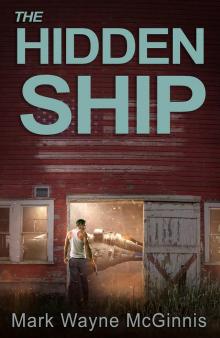 The Hidden Ship
The Hidden Ship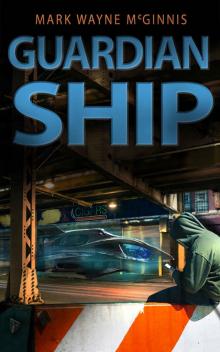 Guardian Ship
Guardian Ship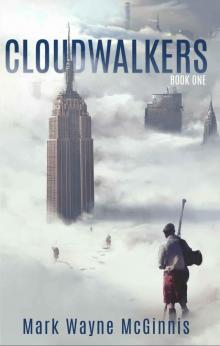 Cloudwalkers
Cloudwalkers Mad Powers (Tapped In)
Mad Powers (Tapped In)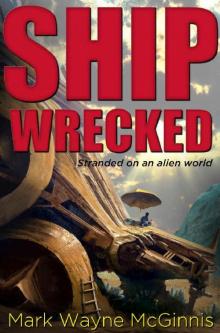 Ship Wrecked
Ship Wrecked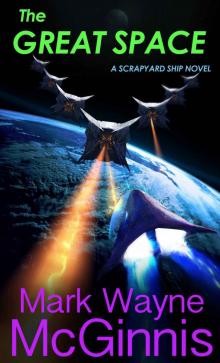 The Great Space (Scrapyard Ship Book 6)
The Great Space (Scrapyard Ship Book 6)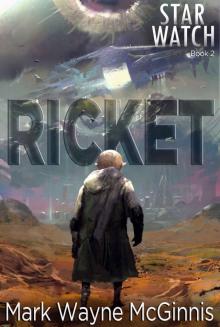 Ricket (Star Watch Book 2)
Ricket (Star Watch Book 2)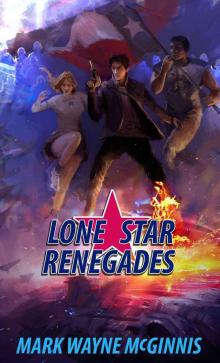 Lone Star Renegades
Lone Star Renegades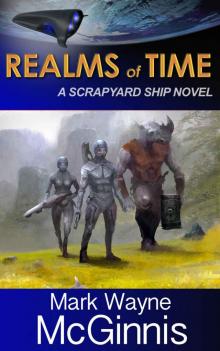 Realms of Time (Scrapyard Ship)
Realms of Time (Scrapyard Ship) Glory for Sea and Space (Star Watch Book 4)
Glory for Sea and Space (Star Watch Book 4)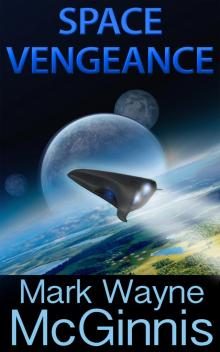 Scrapyard Ship 3 Space Vengeance
Scrapyard Ship 3 Space Vengeance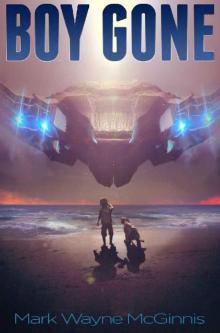 Boy Gone
Boy Gone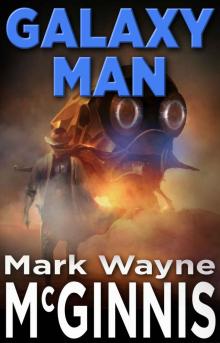 Galaxy Man
Galaxy Man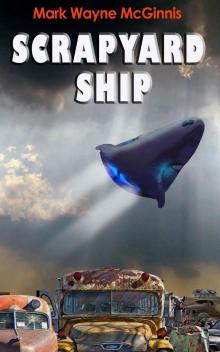 Scrapyard Ship
Scrapyard Ship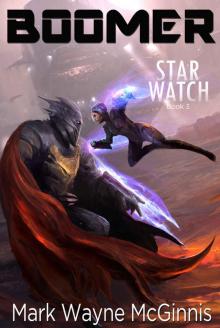 Boomer (Star Watch Book 3)
Boomer (Star Watch Book 3)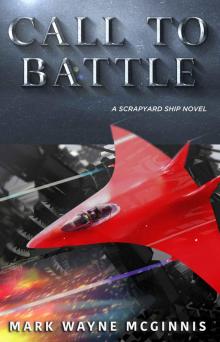 Scrapyard Ship 7: Call to Battle
Scrapyard Ship 7: Call to Battle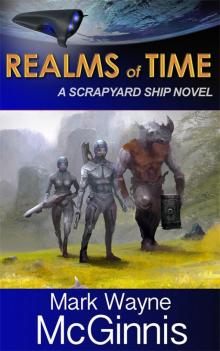 Scrapyard Ship 4 Realms of Time
Scrapyard Ship 4 Realms of Time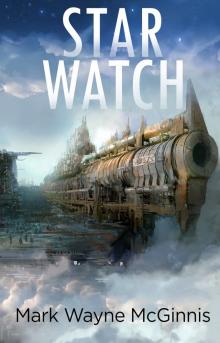 Star Watch
Star Watch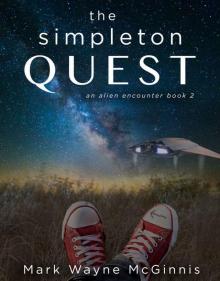 The Simpleton QUEST
The Simpleton QUEST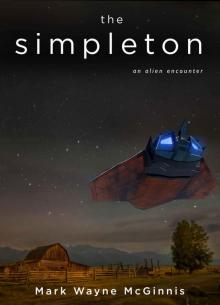 The Simpleton: An Alien Encounter
The Simpleton: An Alien Encounter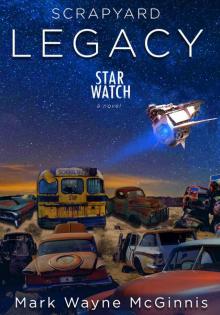 Scrapyard LEGACY (Star Watch Book 6)
Scrapyard LEGACY (Star Watch Book 6)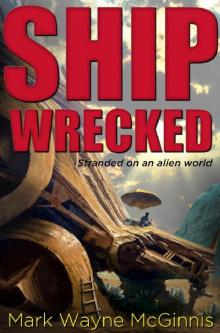 Ship Wrecked: Stranded on an alien world
Ship Wrecked: Stranded on an alien world